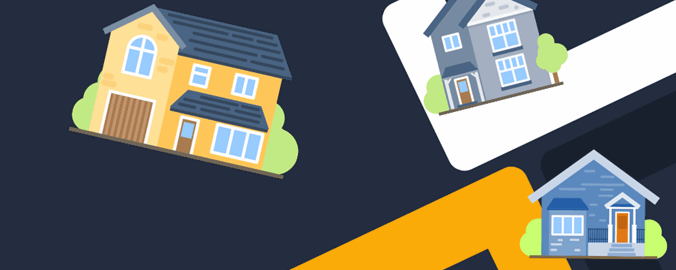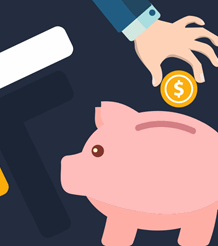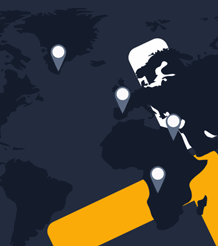
Guide to Property in France
With a chic, sophisticated lifestyle and a warm climate, France remains a firm favourite among overseas property purchasers.
The value of property in France continue to see a healthy increases of around 10% per annum while mini property booms are being experienced in certain locations, such as along the Atlantic coast, Montpelier and Nice, where off-plan and buy-to-let opportunities abound in these highly sought after locations. France boasts a strong rental market due to the fact that the vast majority of French citizens rent their homes for fixed terms of three years, and this creates a healthy demand for rental property in major cities. Meanwhile many holiday resorts are still in need of tourist accommodation to satisfy an increasing number of annual tourist arrivals to France.
At a mere one and a half hour’s flight from the UK, France offers property purchasers easy access via budget airlines and an excellent road infrastructure. This has tremendous appeal among those looking for a second home or a relocation not too far away from the rest of the family back home.
Propertyshowrooms.com and Property In France
We have selected some very carefully vetted opportunities in France that are sure to please our investors. Prices in these locations of France are unbeatable and timely investors will be seeing some very encouraging results from their early purchases. France’s economy is strong and boosted by an ever increasing amount of overseas investment.
New build off-plan property is becoming increasingly popular in French resorts and cities and is slowly replacing a previous love for restoration properties traditionally so popular among most Francophiles.
Prices in certain locations remain low with high growth potential, while these properties are being snapped up as anything from investment, holiday, or new lifestyle options. Statistics show that the property market in France grew by some 87% in eight years to 2005, reflecting a positive growth trend within a buoyant property market.
French property is highly attractive to expatriates and the buying process is a familiar and relatively straightforward one. There are no restrictions on foreign ownership of real estate although the process may take a little longer in France than in some other countries.
When purchasing in a foreign country and foreign language, it is always wise to appoint an independent lawyer to look after your interests when purchasing your property.
Can Foreign Nationals Own Property in France?
Yes, foreign nationals can own property without restrictions in France.
Why Should I Choose France?
Property in France is historically a good investment due in part to a stable economic and social environment that poses no threats to your investment.
Capital growth of around 10% per annum can be achieved in some key areas and despite higher gains offered in the more risky investment arenas of today’s emerging markets, France still remains a firm favourite among British and other European and US investors looking for a safe environment in which to put their money while gaining worthwhile returns.
If you are looking for a buy-to-let investment then France offers enormous rental potential, both in residential and commercial property lettings. Guaranteed rental options abound and yields of around 7-10% are typical. The French tendency to rent rather than buy makes France a great location in which to provide highly sought after rental opportunities in busy tourist or urban areas.
Just a short Channel hop away from the UK and offering a fantastic quality of life and culture, a slightly warmer climate and lower property prices in many areas, France is a firm favourite among British home buyers who purchase French holiday homes for personal use or rental. Many others even relocate or retire to France in search of a better lifestyle while being conveniently close to their families “back home”.
What is the Economic and Political Situation?
The average cost of living is generally lower than in many other EU countries, particularly in rural areas, while Paris is of course an exception with some of the highest prices in Europe. Thanks to the priority given by the French government to ease the purchase procedure by overseas property investors, foreigners can purchase real estate in France without limitations and can benefit from tax advantages involved in leaseback purchase. The French government sees foreign investment in general as a way to create durable jobs and stimulate further economic growth. A skilled and productive technology-orientated labour force as well as a central European location, along with many services and a strong infrastructure all continue to attract foreign investors to France.
How do we Travel to France?
France is easily connected to the UK and budget airlines fly to most French airports, making it an ideal short break away. Alternatively, the Channel Tunnel and cross Channel ferries allow you to travel with your car to a number of convenient ports on France’s northern shores. You are then free to explore onwards via an excellent road infrastructure linking all areas of France and the rest of the Europe.
You Can Fly to France from These Airports
| London | Gatwick, Heathrow, London City, Stansted |
| SW and Wales | Cardiff, Bristol |
| South and SE | Southampton |
| Midlands | Birmingham, east Midlands, Coventry |
| E Anglia | Norwich |
| Northeast | Humberside, Newcastle, Teesside |
| Northwest | Isle of Man, Liverpool, Manchester |
| Yorkshire | Leeds/Bradford |
| Scotland | Aberdeen, Edinburgh, Glasgow, Inverness |
| N Ireland | Belfast City, Belfast International, Londonderry |
| Irish Republic | Dublin |
What is the Direct Flying Time from UK to France?
Direct flying time to Paris from the UK is 1 ½ hours.
Is a Visa Required to Enter France?
A visa is not required to enter France and you can stay for an unlimited period if you are from an EU country and hold a passport (valid for at least 3 months beyond your length of stay) or ID card. However if you are from Australia, Canada or the USA and intend to stay for a period longer than 90 days, you will need to apply to your nearest Embassy for the necessary documentation.
Buying Real Estate in France - The Process
- A property is carefully selected by the buyer and an agreement on price is reached between the vendor and purchaser.
- A solicitor or notary draws up a contract (compromis de vente) to be signed by both parties to agree the principles of the sale.
- A 10% deposit is paid to take the property off the market and the funds are kept in an escrow or other secure account until the date of completion. If the purchaser withdraws in the next 7 days or the sale falls through because one of the conditions for it are not met, then he/she gets the deposit money back. If the purchaser withdraws after 7 days or for any other reason he/she loses the deposit. This is why it is unwise to sign anything in France unless you are 100% certain that you wish to proceed.
- The legal system begins to check out debts and surveys regarding the property
- Once all checks are completed, a final contract (acte de vente) is prepared for signature by the vendor and purchaser at the Notary’s office. The deeds are passed on to the purchaser and the balance of the purchase price is paid.
- The Land Registry is updated once the deed of sale is complete
Documents Required for Purchase
You will need to present the notary with a copy of your birth certificated translated into French, and, if applicable, a translated copy of your marriage certificate.
Fees and Taxes
- Notary fee – approx. 3% of the property price.
- Registration fee – approx. 6%
- Agent’s fee – between 7 and 8%
- Mortgage arrangement fees – depending on your financial institution
- Lawyers – normally up to 8% of purchase price for older properties and 4% for brand new ones
- VAT – 19.6%
- Transfer tax – 7.5% or below 1% for new properties
Capital Gains Tax is not payable on property sale if it has been your principal residence. As a non-resident you are also exempt from paying social taxes. However if the property is not your principal residence, tax will be levied at 16% unless you have owned the property for more than 15 years.
Ongoing Costs
Property taxes: Taxe fonciere (land tax) and Taxe d’habitation (local taxes) are both due annually in arrears in October/November. These taxes are calculated on the theoretical rental value of the property and are payable by the owner of the property. New or newly restored properties are normally exempt from taxe fonciere for the first two years.
Maintenance charges (charges de co-proprietaires) for apartments vary in amount in accordance with neighbourhood and amenities offered.
Income tax: IRPP is payable in France as in any other country, based upon your annual income received.
Your Will
As the laws of succession vary greatly from country to country, you cannot take it for granted that your assets in France will be passed on to those you intend them to. The notary will assist you in drawing up a will to ensure that upon your death, your property is dealt with in accordance with your wishes. To avoid unnecessary complications, this will need to be done prior to signing the final deed of sale.
Mortgages
The mortgage market is well developed in France and due to the great numbers of British purchasers seeking French mortgages, products are easily accessed and are run along a tried and tested procedure. Foreigners can often obtain 100% finance and with interest rates capped at 4%, a French mortgage is a very attractive option to many investors.
Fixed rate mortgages are also available, but not for short terms. Generally they are only available for between 10 and 20 years. The maximum term for a French mortgage is 20 years or up to the age of 70, whichever is sooner.
Mortgages can also be obtained from British lenders such as Abbey, Halifax, HSBC and Woolwich, while specialist brokers may be able to get you a loan locally.
Some developers of new build and off-plan developments offer installment plans over between 12 to 60 months and charges applicable vary according to developer. The Government’s Leaseback system offers purchase with guaranteed rental over many years and yields of some 5.5%, more than covering the cost of mortgage interest, as well as allowing a full VAT refund of 19.6%.
If you possess property in your own country and would like to borrow against this in an equity release plan, we can introduce you to an independent financial advisor who will help you raise the necessary finance.



